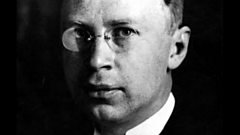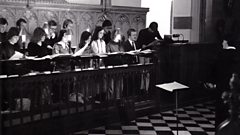Christian Tetzlaff, Written on Skin, Tallis Scholars at 40
Tom Service interviews violinist Christian Tetzlaff, talks to George Benjamin about his new opera and celebrates 40 years of the vocal group the Tallis Scholars.
Last on
More episodes
Clips
Chapters
-
The Tallis Scholars
Duration: 10:32
Christian Tetzlaff
Duration: 12:09
Written on Skin
Duration: 13:35
Death of Prokofiev and Stalin
Duration: 08:41
The Tallis Scholars
![The Tallis Scholars]()
This year sees the 40th anniversary of The Tallis Scholars who were founded in 1973 by their director, Peter Phillips. Through their recordings and concert performances, they have established themselves as one of the leading exponents of Renaissance sacred music throughout the world, and in this season alone are touring both the USA and Japan. The ensemble has also commissioned many contemporary composers – their upcoming anniversary concert will include two new works by Gabriel Jackson and Eric Whitacre.
Peter Phillips talks to Tom about the group’s unique sound and his on-going excitement at taking a mix of contemporary and renaissance western repertoire around the globe.
��Christian Tetzlaff
![Christian Tetzlaff]()
German violinist Christian Tetzlaff is one of the leading musicians of his generation, acclaimed for his musical integrity, technical assurance, and compelling interpretations. Born in Hamburg in 1966 into a musical family – his three siblings are all professional musicians – he began playing the violin and piano at age six, and made his concert debut with the Beethoven Violin Concerto aged 14. From the outset of his career, he has performed and recorded a broad spectrum of repertoire, ranging from Bach's unaccompanied sonatas and partitas to world premieres of contemporary works.
Christian talks to Tom about the importance of the score in getting to the heart of a work, and how for him performing can be a semi religious experience.
��
Written on Skin
![Written on Skin]()
Having previously collaborated on Into the Little Hill, composer George Benjamin and playwright Martin Crimp reunited to create Written on Skin – an opera based on a 12th-century Provencal legend about the troubadour Guillaume de Cabestanh. Premiered at the 2012 Aix-en-Provence festival, the opera is a co-comission with the Netherlands Opera Amsterdam, Théâtre du Capitole de Toulouse, Teatro del Maggio Musicale Fiorentino and Royal Opera House Covent Garden where it receives its UK premiere this week. Directed by Katie Mitchell the story's enduring themes of love, passion and violence are given several contemporary twists.����
Tom talks to George and Martin about their collaboration in this, the most substantial work to date of George Benjamin’s career.
��
��
Prokofiev and Stalin
![Prokofiev and Stalin]()
On the 5th March 1953 Sergei Prokofiev died after suffering a stroke in his home a few blocks from Moscow’s Red Square. Fifty five minutes later it was announced that Joseph Stalin was also dead. As news of Stalin’s death spread thousands of mourners flocked to the Red Square and for three days Prokofiev’s family couldn’t transport his body to the Soviet Composer’s Union Headquarters, where his funeral would take place. When his body finally arrived at the union hall, no musicians could be found to play at his funeral because they were all required to perform at Stalin’s state funeral and adjoining ceremonies. Every florist in town was contracted to provide flowers for Stalin’s funeral, so the family made do with paper flowers and played a recorded version of Prokofiev’s funeral march from the ballet of Romeo and Juliet.����
As the 60th anniversary of these events approaches, Tom talks to musicologist Gerard McBurney and pianist Katia Skanavi about Prokofiev’s relationship with the Stalinist regime, and how the coincidence of their deaths still impacts the composer’s reputation today.����
Broadcast
- Sat 2 Mar 2013 12:15����ý Radio 3
Knock on wood – six stunning wooden concert halls around the world
Steel and concrete can't beat good old wood to produce the best sounds for music.
The evolution of video game music
Tom Service traces the rise of an exciting new genre, from bleeps to responsive scores.
Why music can literally make us lose track of time
Try our psychoacoustic experiment to see how tempo can affect your timekeeping abilities.
Podcast
-
![]()
Music Matters
The stories that matter, the people that matter, the music that matters










